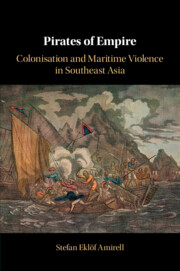
-
Select format
-
- Publisher:
- Cambridge University Press
- Publication date:
- August 2019
- August 2019
- ISBN:
- 9781108594516
- 9781108484213
- 9781108706100
- Creative Commons:
-
This content is Open Access and distributed under the terms of the Creative Commons Attribution licence CC-BY-NC-ND 4.0.
https://creativecommons.org/creativelicenses - Dimensions:
- (228 x 152 mm)
- Weight & Pages:
- 0.52kg, 272 Pages
- Dimensions:
- (229 x 152 mm)
- Weight & Pages:
- 0.41kg, 278 Pages
- Subjects:
- Area Studies, Asian Studies, History, South-East Asian History, Global History
Open AccessYou have access to this book- Subjects:
- Area Studies, Asian Studies, History, South-East Asian History, Global History
Book description
The suppression of piracy and other forms of maritime violence was a keystone in the colonisation of Southeast Asia. Focusing on what was seen in the nineteenth century as the three most pirate-infested areas in the region - the Sulu Sea, the Strait of Malacca and Indochina - this comparative study in colonial history explores how piracy was defined, contested and used to resist or justify colonial expansion, particularly during the most intense phase of imperial expansion in Southeast Asia from c.1850 to c.1920. In doing so, it demonstrates that piratical activity continued to occur in many parts of Southeast Asia well beyond the mid-nineteenth century, when most existing studies of piracy in the region end their period of investigation. It also points to the changes over time in how piracy was conceptualised and dealt with by each of the major colonial powers in the region - Britain, France, the Netherlands, Spain and the United States. This title is also available as Open Access on Cambridge Core.
Reviews
‘In Pirates of Empires, Stefan Eklöf Amirell provides a detailed, often vivid presentation of the European crackdown on piracy in Southeast Asia. A refreshingly complex take on both the undeniable brutality of piracy for indigenous populations and the cynical exploitation of this scourge to advance colonial rule.'
Michael Miller - University of Miami
‘This is a complex and engaging book; it crosses a good portion of Southeast Asia, and looks at the deep history of piracy in the region from a number of inter-locking angles. Solidly researched and provocative, it helps us to look at the phenomenon of piracy in new and fascinating ways.'
Eric Tagliacozzo - Cornell University, New York
Contents
Full book PDF-
Pirates of Empire
pp i-ii -
-
- You have access
- Open access
- HTML
- Export citation
-
-
Pirates of Empire - Title page
pp iii-iii - Colonisation and Maritime Violence in Southeast Asia
-
-
- You have access
- Open access
- HTML
- Export citation
-
-
Copyright page
pp iv-iv -
-
- You have access
- Open access
- HTML
- Export citation
-
-
Contents
pp v-v -
-
- You have access
- Open access
- HTML
- Export citation
-
-
Maps
pp vi-vi -
-
- You have access
- Open access
- HTML
- Export citation
-
-
Preface
pp vii-viii -
-
- You have access
- Open access
- HTML
- Export citation
-
-
Acknowledgements
pp ix-x -
-
- You have access
- Open access
- HTML
- Export citation
-
-
Introduction
pp 1-20 -
-
- You have access
- Open access
- HTML
- Export citation
-
-
1 - Piracy in Global and Southeast Asian History
pp 21-41 -
-
- You have access
- Open access
- HTML
- Export citation
-
-
2 - The Sulu Sea
pp 42-95 -
-
- You have access
- Open access
- HTML
- Export citation
-
-
3 - The Strait of Malacca
pp 96-160 -
-
- You have access
- Open access
- HTML
- Export citation
-
-
4 - Indochina
pp 161-208 -
-
- You have access
- Open access
- HTML
- Export citation
-
-
Conclusion
pp 209-231 -
-
- You have access
- Open access
- HTML
- Export citation
-
-
Epilogue: Piracy and the End of Empire
pp 232-235 -
-
- You have access
- Open access
- HTML
- Export citation
-
-
Bibliography
pp 236-256 -
-
- You have access
- Open access
- HTML
- Export citation
-
-
Index
pp 257-266 -
-
- You have access
- Open access
- HTML
- Export citation
-
Metrics
Altmetric attention score
Full text views
Full text views help Loading metrics...
Loading metrics...
* Views captured on Cambridge Core between #date#. This data will be updated every 24 hours.
Usage data cannot currently be displayed.
Accessibility standard: Unknown
Why this information is here
This section outlines the accessibility features of this content - including support for screen readers, full keyboard navigation and high-contrast display options. This may not be relevant for you.
Accessibility Information
Accessibility compliance for the PDF of this book is currently unknown and may be updated in the future.


